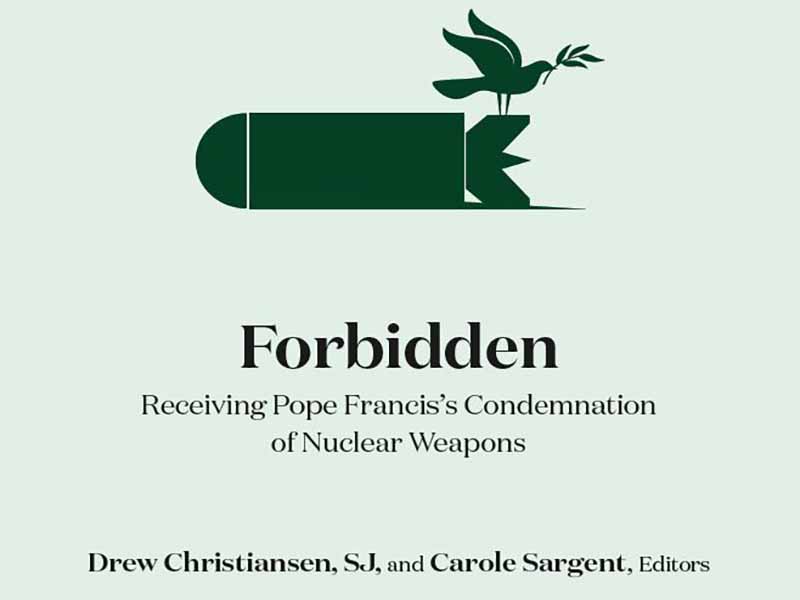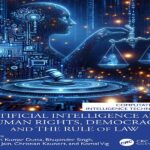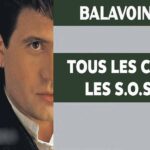- عنوان کتاب: Forbidden -Receiving Pope Francis’s Condemnation of Nuclear Weapons
- نویسنده: Drew Christiansen
- حوزه: خلع سلاح هستهای
- سال انتشار: 2024
- تعداد صفحه: 404
- زبان اصلی: انگلیسی
- نوع فایل: pdf
- حجم فایل: 3.72 مگابایت
خورخه ماریو برگولیو با انتخاب فرانسیس به عنوان نام پاپی خود، دستور کاری را مشخص کرد که امیدوار بود از مرد فقیر آسیزی بگیرد: در آغوش گرفتن فقرا، مراقبت از کره زمین و ترویج صلح بین مردم زمین. از همان ابتدا، فداکاری او نسبت به فقرا، پناهندگان، مهاجران و بیخانمانها مشهود بود. عمق تعهد او به محیط زیست در بخشنامهاش «در باب مراقبت از خانه مشترکمان» و در برنامه هفت ساله واتیکان برای اجرای آن، به نمایش عمومی درآمد. تعهد پاپ فرانسیس به صلح، اگرچه کمتر چشمگیر بود، اما مسیرهای جدیدی را، به ویژه در روابط با جهان اسلام، روشن کرده است. او به پیمان مدارا با رهبران مسلمان در خلیج فارس پیوست و از عراق بازدید کرد تا مردم آن را در تلاش برای بازسازی کشورشان پس از بیست سال جنگ، تأیید کند. در دستاوردی که پیشینیان او از آن غافل بودند، پاپ فرانسیس با چین در مورد انتصاب اسقفها به توافق رسید. حمایت او از خلع سلاح هستهای کمتر شناخته شده است. در سال ۲۰۱۷، واتیکان از اولین کشورهایی بود که پیمان سازمان ملل متحد در مورد منع سلاحهای هستهای را امضا و تصویب کرد. در سمپوزیوم واتیکان در ماه نوامبر، پاپ فرانسیس داشتن، تهدید به استفاده و استفاده از سلاحهای هستهای را محکوم کرد. در پی این محکومیت، شکاکان پرسیدند که او چه انتظاری دارد؟ آیا افسران باید از سمتهای خود استعفا دهند؟ آیا پرسنل موشکی باید به مخالفان وظیفهای گزینشی تبدیل شوند؟ آیا کشورها میتوانند زرادخانههای هستهای خود را رها کنند؟ از این گذشته، مدافعان این سلاحها اعتراض دارند که مواد منفجره هستهای پس از اختراع، دیگر قابل اختراع نیستند. ممنوعه: دریافت محکومیت سلاحهای هستهای توسط پاپ فرانسیس به این سوال میپردازد که در پاسخ به محکومیت پاپ چه باید بکنیم. این کتاب تلاش میکند تا پیشینه و راهنمایی را برای کسانی – از جمله شهروندان کشورهای مسلح به سلاحهای هستهای و متحدان آنها – که محکومیت پاپ برایشان انتخابهای حرفهای و مدنی چالشبرانگیزی را ایجاد میکند، ارائه دهد. این افراد شامل رهبران سیاسی، متخصصان نظامی، دانشمندان تسلیحات و روشنفکران دفاعی هستند. این کتاب همچنین به عنوان منبعی برای کشیشان در نظر گرفته شده است که از آنها خواسته میشود زنان و مردان را در این انتخابهای اخلاقی همراهی کنند: کشیشان، واعظان، مشاوران کشیشان، مدیران معنوی و معلمانی که آموزههای اجتماعی کاتولیک را با جامعه ایمانی و عموم مردم به اشتراک میگذارند. سوال این است که «چه باید بکنم؟» – یا «با هم چه باید بکنیم؟» – نه سوال مورد انتظار و به طرز ظاهری دقیقتر «چه باید بکنم؟» دلایل سهگانه دارد. اول، آموزههای پاپ فرانسیس، مطابق با شورای دوم واتیکان، دعوتی برای اقدام برای تغییر جهان، به ویژه برای شرکت در جنبش خلع سلاح هستهای است. این موضوع به معنای جلوگیری از داشتن «دستهای آلوده» نیست. بلکه فراخوانی برای پاسخ به یک نشانه فوری زمانه است، نشانه ای که از زمان پاپ سنت جان بیست و سوم شصت سال پیش در دستور کار سیاست اجتماعی کاتولیک بوده است. دوم، خلع سلاح هستهای یک فراخوان شخصی است. خداوند افراد و گاهی گروهها را به شیوهای شخصی برمیانگیزد و از آنها میخواهد راههایی متناسب با موقعیتها و استعدادهای شخصی خود برای کمک به حذف سلاحهای هستهای پیدا کنند. سوم، حذف سلاحهای هستهای وظیفهای است که بر دوش همه ماست، به خصوص اگر شهروند کشورهای مسلح به سلاحهای هستهای یا اتحادی باشیم که در آن سلاحهای هستهای محور سیاست دفاع ملی هستند. بدون شک، عنصر قوی وظیفه در محکومیت پاپ وجود دارد. اما «بایدها» تجربه وجدان را از بین نمیبرند. آموزش اخلاقی پاپ فرانسیس بر خیر عمومی، بر آنچه خداوند ما را به خاطر خیر عمومی به انجام آن فرا میخواند، تمرکز دارد، که در این مورد، حذف سلاحهای هستهای و تهدید جنگ هستهای است. محکومیت پاپ تأکید کمتری بر تعهدات حداقلی دارد و بیشتر بر رویکردهای سنتی به آنچه باید برای جلوگیری از گناه کبیره انجام دهم، تأکید دارد. این اخلاقی برای بزرگسالانی است که مطابق با شورای دوم واتیکان، مسئولیت زندگی خود، جهت جوامع خود و به ویژه استفاده از فناوریهایی را که توسعه دادهاند، بر عهده میگیرند.
In choosing Francis as his papal name, Jorge Mario Bergoglio identified an agenda he hoped to take from the poor man of Assisi: to embrace the poor, care for the planet, and foster peace among the peoples of Earth. From the beginning his devotion to the poor, refugees, migrants, and the homeless was evident. The depth of his commitment to the environment came to public view in his encyclical Laudato si’ (On Care of Our Common Home) and in the seven-year program the Vatican has undertaken to implement it. Though less dramatic, Pope Francis’s commitment to peace has blazed new paths, especially in relations with the Muslim world. He joined in a compact of tolerance with Muslim leaders in the Persian Gulf and visited Iraq to affirm its people as they attempted to rebuild their country after twenty years of war. In an achievement that eluded his predecessors, Pope Francis concluded an agreement with China on the appointment of bishops. Less well known has been his support for nuclear disarmament. In 2017, the Holy See was among the first states to sign and ratify the United Nations Treaty on the Prohibition of Nuclear Weapons. At a Vatican symposium that November, Pope Francis condemned the possession, threat to use, and use of nuclear weapons. In the wake of the condemnation, skeptics asked, what does he expect? Should officers resign their commissions? Should missile personnel become selective conscientious objectors?5 Can states abandon their nuclear arsenals? After all, once invented, the weapons’ defenders object, nuclear explosives cannot be uninvented. Forbidden: Receiving Pope Francis’s Condemnation of Nuclear Weapons addresses the question of what we should do in response to the papal condemnation. The book attempts to provide background and guidance for those—including citizens of nuclear-armed states and their allies— for whom the papal condemnation presents challenging vocational and civic choices. These include political leaders, military professionals, weapons scientists, and defense intellectuals. The book is also intended as a resource for pastoral workers who are asked to accompany women and men in making these moral choices: pastors, preachers, pastoral counselors, spiritual directors, and teachers who share Catholic social teaching with the community of faith and the broader public. The question is “What shall I do?”—or “What shall we do together?”— rather than the expected and speciously more exacting question “What must I do?” The reasons are threefold. First, Pope Francis’s teaching, in keeping with the Second Vatican Council, is an invitation to action to change the world, specifically to participate in the nuclear disarmament movement. It is not a matter of keeping oneself from having “dirty hands.” Rather, it is a call to respond to an urgent sign of the times, one that has been on the Catholic social policy agenda from the time of Pope Saint John XXIII sixty years ago. Second, nuclear disarmament is a personal call. God prompts individuals and sometimes groups in a personal way, asking them to find ways appropriate to their own situations and personal gifts to contribute to the elimination of nuclear weapons. Third, eliminating nuclear weapons is a duty incumbent upon us all, especially if we are citizens of nuclear weapons–armed states or an alliance in which nuclear weapons are central to national defense policy. No doubt, there is a strong element of duty in the papal condemnation. But “oughts” do not exhaust the experience of conscience. Pope Francis’s moral pedagogy focuses on the greater good, on what God calls us to do for the sake of the common good, in this case abolishing nuclear weapons and the threat of nuclear war. The pope’s condemnation places less emphasis on minimal obligations than on traditional approaches to what I must do to avoid grave sin. This is a morality for adults who take responsibility, in keeping with the Second Vatican Council, for their own lives, the direction of their own societies, and especially use of the technologies they have developed.
این کتاب را میتوانید از لینک زیر بصورت رایگان دانلود کنید:
Download: Forbidden -Receiving Pope Francis’s Condemnation of Nuclear Weapons




































نظرات کاربران